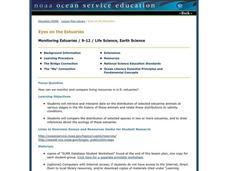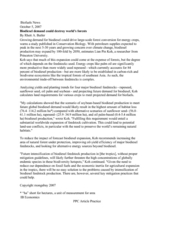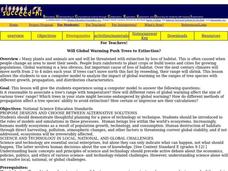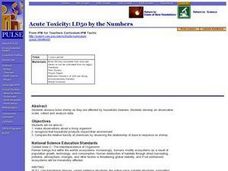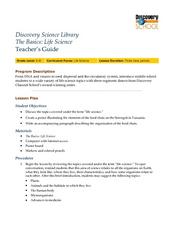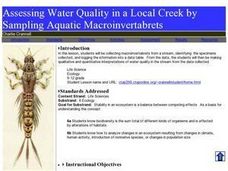Curated OER
Eyes on the Estuaries
High schoolers study estuaries and compare several ones in the U.S. In this estuary lesson students interpret data and compare the distribution of different species.
Curated OER
What Do You Know About Horseshoe Crabs?
High schoolers create a learning tool based on information given on the assigned website. In this ocean life lesson, students read about the horseshoe crab and develop a worksheet, scavenger hunt, board game or any tool to aid learning....
Curated OER
Water and Sanitation
Learners examine water contamination problems. In this global studies lesson, students compare and contrast water sanitation issues on Malawi, Tanzania, and Ontario. Learners propose solutions to the water sanitation problems.
Curated OER
Biodiesel Demand Could Destroy World's Forests
In this global issues worksheet, students read a 1-page article about biodiesel demand then write PPC articles that address the costs of biodiesel use.
Curated OER
Water Quality Survey: Monitoring the Sustainability of Pigeon Creek
Students research the History of Pigeon Creek (or any watershed in your area). For this environmental science lesson, students conduct field tests such as pH and nitrates. They collect data and compare what they collected with other groups.
Curated OER
Will Global Warming Push Trees to Extinction?
Learners examine the extinction of plants and animals through loss of habitat. They investigate the effects of global warming. They use a computer model to analyze the impact of global warming on tree growth and distirbution...
Curated OER
Acute Toxicity: LD50 by the Numbers
High schoolers observe brine shrimp as they are affected by household cleaners, develop observation scale, collect and analyze data, and discuss how household products and pesticides negatively impact environment.
Curated OER
Aphids and Ladybirds
Students record observations of ladybird beetles and aphids. They develop questions concerning the behavior of ladybird beetles and aphids that are testable by a classroom experimentation. Students develop an investigation.
Curated OER
"Sea" Me Race
Third graders explore the ocean habitat. They race each other while portraying a different creature of the sea. They research various types of creatures found in the sea and portray that creature while racing classmate.
Curated OER
Amphipods
Students identify organisms that live at the bottom of the body of water. In this biology instructional activity, students evaluate the effects of pollution to amphipods population. They examine collected data and create a bar graph...
Curated OER
Florida's Springs
Learners follow the journey that water takes in aquifers and springs. They write about the major threats to the aquifer and the solutions to these threats.
Curated OER
Explore the Food Web
Students identify plants and animals in the journals of Lewis and Clark's expedition. They describe the various animal habits. Students interpret the behaviors of the animals discovered on the expedition. They design a food web using...
Curated OER
The Basics:Life Science
Students explore concepts in life science using segments drawn from Discovery Channel. In this life science lesson, students participate in discussions about the food chain. Students create a poster to illustrate a predator and prey...
Curated OER
Cicada Invasion
Students consider how some animals, periodical cicadas, survive well in a particular environment due to the species' life cycle.
Curated OER
Insect Biodiversity
Young scholars observe the process of transect sampling using insect nets, to get a chance to compare the presence of different species and populations in various vegetational areas. They study the different specimens caught and compare...
Curated OER
Communication in Bees
Eighth graders identify and interpret a scientific investigation and a hypothesis through experimentation and testing a hypothesis. They identify what scientists hypothesized about the communication of stingless bees. Finally, 8th...
Curated OER
Assessing Water Quality in a Local Creek by Sampling Aquatic Macroinvertabrets
Students experiment collecting macroinvertebrates from a stream and identify the specimens collected and then log in the information into a data table. From the data, they make qualitative and quantitative interpretations of water quality.


